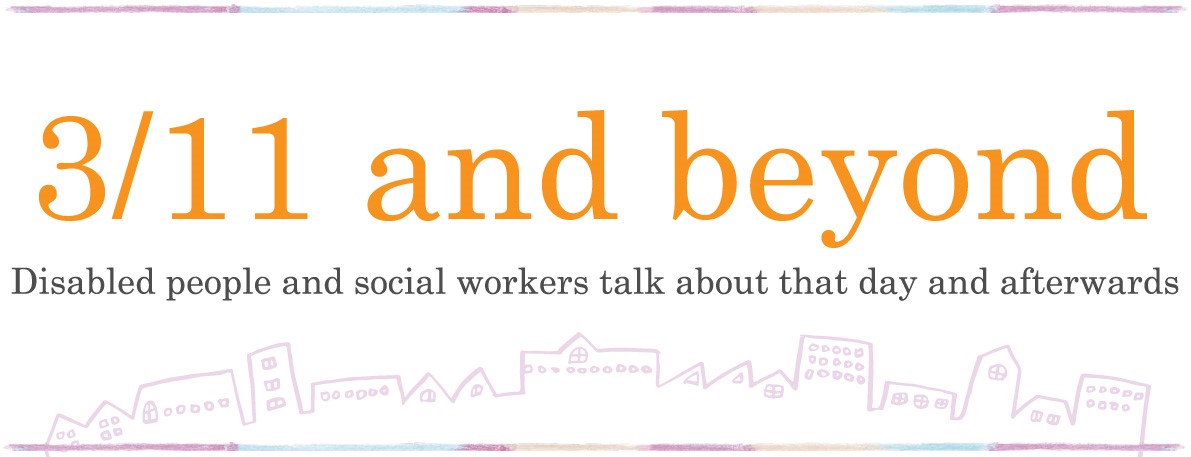
Story: NPO Kagayaku Nakama Challenged, Orion Co-Living Facility for the Disabled (Former name: Kokoro Saori)
Trainee: Shoko (woman/ age 38 at the time/ limited use of upper body due to dysfunction)
Staff: Ms. Kumai (participated in the interview to assist Shoko)

Shoko experienced the earthquake while working at Orion.
What were you making?
Shoko: I was making a vest for myself. I had just finished it.
Were you injured?
Shoko: No.
Kumai: Shoko was by the stairs at the time of the earthquake. She had just come out of a certain room in our building and gone by the stairs to reach the bathroom on the other side.
Shoko: I was washing my hands. I went out into the hall with soap still on my hands.
Kumai: I had the people who were in the rooms hide under desks. After the earthquake was over, I noticed Shoko wasn’t there. Then when I opened the door, I found her by the stairs with another woman (an employee of the building). I saw that and shuddered. It was thanks to this other woman with her that Shoko didn’t fall down the stairs.
Shoko first became worried when her phlegm aspirator’s battery died due to a loss of power, and she knew she might have difficulty breathing.
After the shaking stopped, did you return home?
Shoko: No, I moved to Minato Elementary School (near the Orion workshop). I stayed there for two nights, then some people from the Self-Defense Force took me to the Ishinomaki Red Cross Hospital
Around how long were you in the hospital?
Shoko: I think it was around ten days.
Kumai: Shoko needed phlegm aspiration. When I told that to the managers of the Minato Elementary shelter, they said they would arrange to have her taken to the Red Cross Hospital. Then on Sunday (3/13), they moved her. We staff assumed they would take her straight to the hospital on the day they moved her, but we later heard she actually didn’t get there until two days later.
There was a nursing school right next to the elementary school, so apparently they had assistant nurses and nursing school students looking after her for the two days she stayed at the elementary school. After that, all those nurses gathered at the Red Cross Hospital, so the nursing-care helpers continued to assist her.

Shoko’s friends at Orion were invaluable to her.
Ms. Kumai: When I said I wanted her to go to the hospital, Shoko didn’t want to go.
Shoko: Hehehe
Kumai: When Shoko said she didn’t want to go, I said no, you have to go.
Shoko: Hehehe
She doesn’t like the hospital?
Kumai: No, I don’t mean she doesn’t like it. She knew she would be separated from her other Orion friends if she went to the hospital, so she said, “I want to stay here with everyone.”
I think it’s the same now. If something like this happens again, I want to try to make sure we can all stay together. Because I was the one who told Shoko to go at that time, and I wished I didn’t have to do that. If something happens, everyone will feel safest if they can stay together. (Orion now has an in-house power generator in case of another disaster.)
Shoko’s home was far away from Orion, so her family who lived with her could not easily go check on her.
Was there anything that worried you?
Shoko: I was worried that I couldn’t get through to my family on the phone.
Around how many days was it before you were able to talk to them?
Shoko: My parents heard from their neighbors that I’d been taken to the Ishinomaki Red Cross Hospital, so they came to the hospital and we were able to talk a little there.
Kumai: Shoko’s family really had deep roots in the local community. Her parents owned a store.
Shoko’s mother and father weren’t able to come check on her, but a neighbor came here by bicycle (to the building they had evacuated from, where the old workshop was).
I was just trudging through the mud to get water when I happened to meet the neighbor. I told them Shoko was safe.
Even though our workshop was far away from Shoko’s house, this person empathized with Shoko’s parents who were worried about her and came to check on her. That made me realize how deeply connected Shoko’s family was with the community.
Before coming to Orion, Shoko didn’t like going out and avoided interacting with others. But she grew a lot through her disaster experience.
Do you feel like you’ve changed since the disaster?
Shoko: Um, I don’t really feel like I have.
Kumai: She used to be a normal office worker. Then when she was 25, she developed a blood vessel disease. Around ten years after that, she started coming here (to Orion).
For those ten years before she came to Orion, apparently she didn’t want to see anyone. But then someone strongly recommended us to her, saying it would be better if she had friends. I guess she was pretty reluctant to come.
So going out was a really big decision for her.
Kumai: Yes, definitely.
Because of the disaster, all kinds of people came to interview her. That helped her get better at interacting with people. She doesn’t even seem to mind getting her picture taken now. I think she’s really changed.
Shoko’s parents are getting on in years now, so we’re trying to encourage her to be independent. Right now we’re helping her prepare to stay here for short periods.
 Story: NPO Kagayaku Nakama Challenged, Orion Co-Living Facility for the Disabled (Former name: Kokoro Saori)
Story: NPO Kagayaku Nakama Challenged, Orion Co-Living Facility for the Disabled (Former name: Kokoro Saori)


